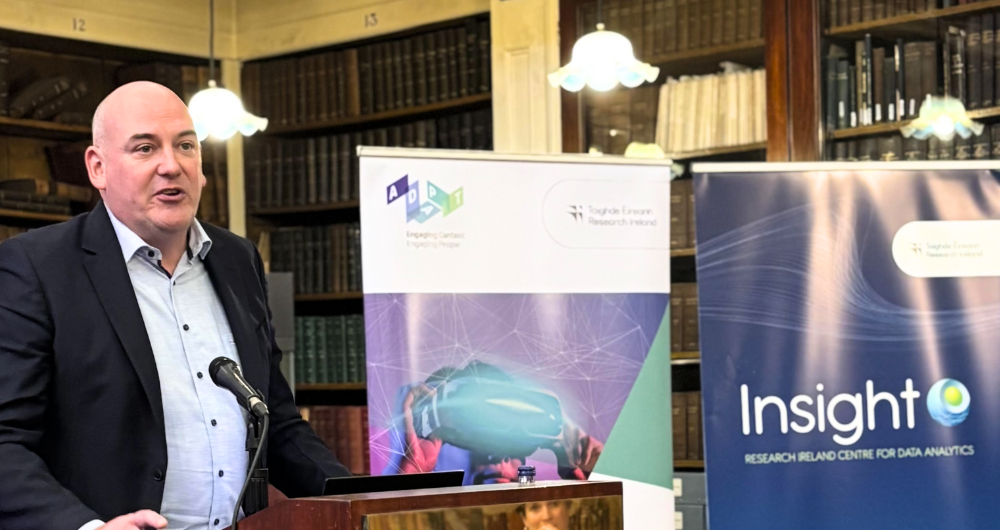
Malcolm Byrne TD, Chair of the Oireachtas Committee on Artificial Intelligence (AI) delivered the opening remarks at a Royal Irish Academy (RIA) conference on the Future of AI and Education on Tuesday September 23 2025. Co-chaired by Andrew Hines and Brian Mac Namee of Insight at UCD and structured around a keynote lecture and two discursive panels, the half-day event considered AI in the context of second and third-level education and in particular, the shift from the viewpoint that AI should be banned to one of encouraging digital literacy and responsible, critical use.
Co-sponsored by the Insight Research Ireland Centre for Data Analytics and the Adapt Research Ireland Centre for AI-Driven Digital Content, this interdisciplinary conference, coordinated by a working group from the RIA, considered the future of AI and education through the lens of enhancing literacy and exploring the adoption and integration of AI in teaching, learning, and assessment.
The event brought together a variety of perspectives to explore the integration of AI into education, reflecting on challenges, opportunities, safeguards, policy and regulation.
The conference on ‘The future of AI and Education’ was programmed and organised by a working group comprised of two of the Royal Irish Academy’s multidisciplinary committees: the Engineering and Computer Sciences Committee and the Languages, Literature, Culture and Communications Committee.
Brian Mac Namee, Director at Insight Research Centre and co-chair of the working group, said;
‘Educators have legitimate concerns about the potential impact of AI on teaching and learning, but highly restrictive measures around AI are not sustainable – practically or pedagogically. Experts in teaching and learning and AI experts need to work together to devise AI systems and deployment strategies that enhance literacy and learning. Today’s conference will imagine a future for AI in education that supports teachers and empowers learners; informing policy, research and investment.’
The keynote lecture was delivered by Wayne Holmes, Full Professor of Critical Studies of Artificial Intelligence and Education at University College London. In his talk he reflected on the ethical, human, and social justice implications of the application of AI in education and set the context for the ensuing panel discussions.
The first panel looked at enhancing AI literacy in teaching and learning. The panellists were James O’Sullivan, Teaching & Learning Policy Advisor for Artificial Intelligence, Higher Education Authority; Phil Hanna, Dean of Education in the Faculty of Engineering and Physical Sciences, Queen’s University Belfast; Tara Cullinane, student in the College of Engineering and Architecture, University College Dublin; Sue Sentance, Director, Raspberry Pi Computing Education Research Centre, University of Cambridge. The panel touched on areas such as the usefulness of AI; responsible use of AI in an educational context; developing student skills in discernment as well as critical literacy; the evolving domain of digital skills, in particular teachers’ skills; student experiences in AI-assisted learning; resourcing, guidance and policy.
The second panel explored the integration of AI literacy in assessment. The panellists were Roisín Morris-Drennan, Acting Head of Qualifications Standards and Certification, Quality and Qualifications Ireland; Geraldine O’Neill, Associate Professor and educational developer, University College Dublin Teaching & Learning; Adrian Kirwan, Critical Skills, Maynooth University; Michael McEnery, Business Manager at the Council for the Curriculum, Examinations and Assessment, Northern Ireland. In this discussion the panellists considered issues such as quality assurance and integrity; the nature and purpose of assignments and examinations; detection and transparency; updating, adapting and redesigning assessment; and meeting learning outcomes in an AI-assisted world.